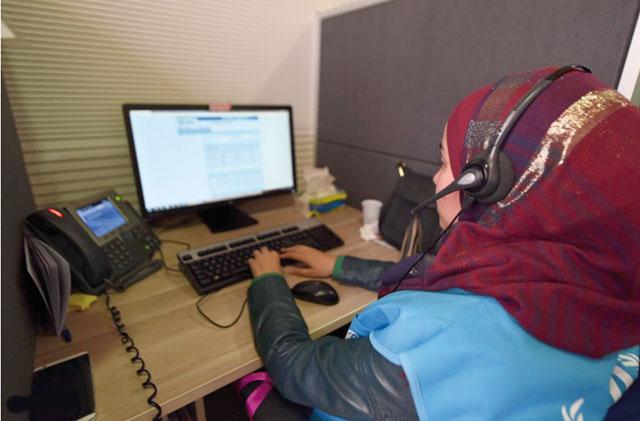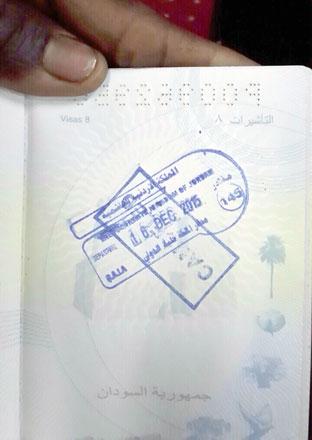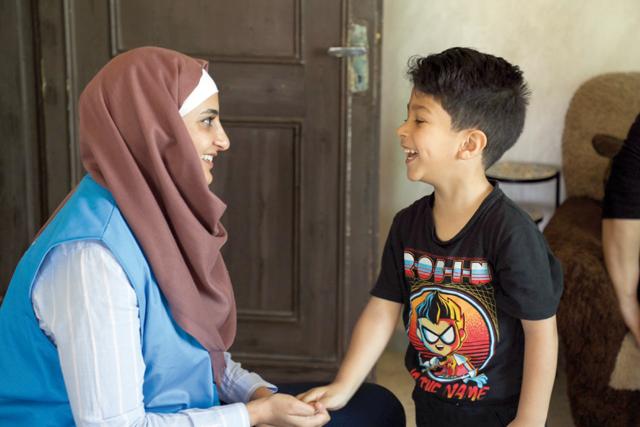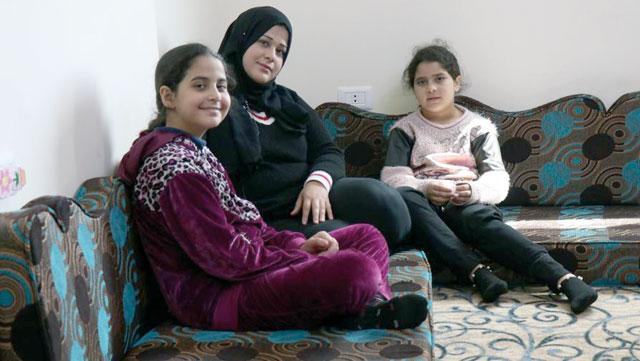You are here
1.7m calls answered by UNHCR refugee helpline since 2008
By Camille Dupire - Apr 05,2018 - Last updated at Apr 05,2018

One of the 14 UNHCR staff responds to a call made to the Refugee Helpline Jordan recently (Photo courtesy of UNHCR / M. Hawari)
AMMAN — A helpline aimed at providing support and advice on issues faced by refugees living in Jordan has answered over 1.7 million calls since its inception ten years ago, a statement by the UN Refugee Agency (UNHCR) said.
One of the largest refugee helplines in the world, the Refugee Helpline Jordan offers support on a wide range of topics including cash assistance, resettlement, registration, access to healthcare, among others.
The line also receives queries about other agency programmes such as partners of the Common Cash Facility or the World Food Programme (WFP) voucher programme, which are then referred to the new WFP helpline for direct assistance.
Launched in 2008 to respond to the needs of refugees living in Jordan, the helpline system was upgraded in 2014 to cater for the increasing number of calls following the outbreak of the Syrian crisis.
In 2017 alone, UNHCR received an average of 45,000 calls per month, and was able to answer around 60 per cent of them.
“Before the upgrade, we had an average waiting time of four minutes, which led many of the callers to abandon the calls. We conducted an additional upgrade at the end of 2017, with enhanced automated response features aimed at reducing the number of abandoned and unanswered calls,” a UNCHR representative said, adding that nearly 150,000 calls were answered monthly, amounting to 70 per cent of the calls.
Following the upgrade, the call volume soared from 160 calls per hour in November 2017 to 1,000 calls per hour as of February 2018, the official noted.
“Our calls come from all Jordan, with a majority from the Amman Governorate (40 per cent), followed by Irbid (23 per cent), Mafraq (14 per cent) and Zarqa (10 per cent). This reflects the distribution of refugees across Jordan and helps us better assess the geographical needs,” the UNHCR official added.
“Our helpline is one of the approaches UNHCR uses for two-way communication, providing information and feedback for more than 730,000 refugees living in Jordan,” the UNHCR said, adding that the line does not only accept phone calls, but also provides outgoing messaging.
The majority of the calls are related to cash assistance, which is currently provided to 27,000 families in the country. Refugees also call to appeal decisions impacting their cash assistance and a small number of calls are related to technical issues around use of the ATM network.
About 15 per cent of the calls to the helpline focus on resettlement, either to enquire about eligibility or request updates on the resettlement process, according to UNHCR.
On registration, which account for 5 per cent of calls, a recorded message advises refugees to visit UNHCR registration centres, as these queries can only be addressed after confirmation of identity.
The UNHCR stressed that all calls can be made for free by using the Zain SIM card provided by the Agency, noting that, as of February 2018, over 143,000 families benefitted from the free SIM card.
“In addition to our 14 UNHCR staff who speak directly to refugees from 8am to 4pm during weekdays, we also have 46 automated lines that can help callers using Interactive Voice Response (IVR) technology,” the UNHCR official continued, noting that around 95 per cent of calls can be handled by helpline staff without the need for referral to another section.
“Our staff is trained to respond to refugees in distress through basic counseling; if an issue arises that require a referral and follow up, a ‘referral ticket’ is provided for refugees to be linked with other relevant professionals,” the statement read.
“Ultimately, the helpline also serves as a public awareness tool to pass messages to refugees in urban settings This is done in collaboration with direct messaging through urban community support committees and helpdesks across the country, which helps reach populations traditionally out of reach," the statement concluded.
Related Articles
AMMAN — Jordanian authorities on Thursday morning postponed deporting 800 Sudanese minutes before they were to be sent back home after one m
AMMAN — In 2021, approximately 5,800 refugees returned from Jordan to Syria, which took place on a voluntary basis, independent of UNHCR, ac
AMMAN — Following a surge in donor activity over the last month, the UNHCR’s 2019 operations in the Kingdom are 44 per cent funded as of the














